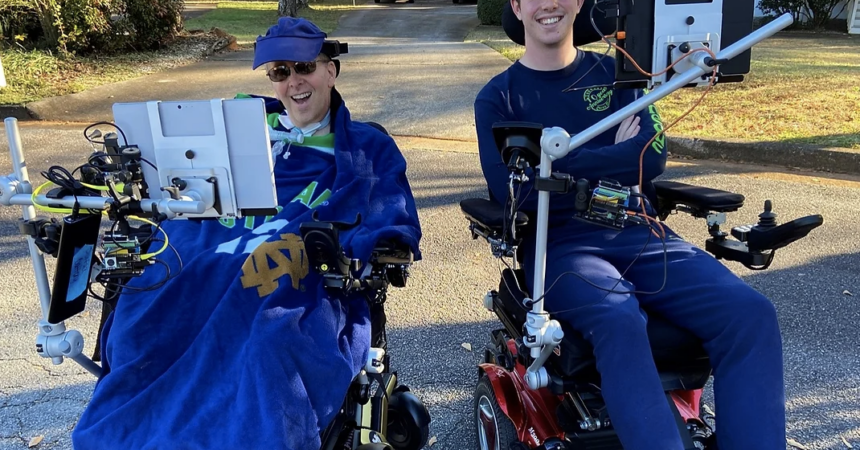
Father’s ALS diagnosis inspired Sexton’s invention

Photo submitted
By Abraiya Ruffin
Special to the Outlook
When the diagnosis confirmed that his father has the dreaded Amyotrophic lateral sclerosis, John Sexton decided to go head-on against the incurable disease.
The debilitating, life altering disease that is also known as ALS got progressively worse. Sexton became more determined.
Relying on their technical background Sexton and his father came up with a hands-free device. It proved to be ideal for Sexton’s father.
The device passed its biggest test at the ACC InVenture Prize, a Shark-Tank-style competition last Thursday at host school FSU. Sexton walked off with first place in his category for the $15,000 top prize.
Not a bad payoff for an invention that came out of his passion to help reduce his father’s suffering.
“Not only was the physical part of the disease challenging for my dad,” he said, recalling the early days, “but with it came a loss of independence and decreased quality of life.”
Being an undergrad student at the University of Notre Dame made Sexton, a sophomore, eligible for the competition. The competition was exclusively for students from all 15 ACC universities to pitch their inventions or businesses to a panel of judges.
FSU internship coordinator, Britain Dwyre Riley, said the competition was an opportunity for students to help secure their future.
“This is a great chance for students like John to show the entrepreneurship and innovation commitment that the ACC program has,” Riley said.
Things are now looking up for the young man who started with nothing more than a dream to help his father.
Sexton calls the concept Life Drive and he is its CEO.
“It started off as a technical project and then moved toward an entrepreneurial sense,” Sexton said. “We’re looking to help a lot of people and families with similar conditions.”
The device will give users more mobility, while its technology will also allow some the option of using eye and voice to control the joystick function.
The prize money that he took home from winning the competition will help him to expose his device to more people who suffer the rare neurological disease that weakens muscles and impacts physical function, Sexton said.
He knows there is a growing need. More than 5,000 people in the U.S. are diagnosed with the disease each year.
He’s seen up close how debilitating ALS could be.
“Two years into the disease my dad lost the ability to use his hands to drive his chair so he had a computer that he could use to talk with his eyes because he was also losing the ability to speak but he needed something more advanced,” Sexton said.
Sexton has big plans for improving his device, including more safety testing, improving efficiency and ensuring compliance with the FDA.
“I’m just really happy,” he said. “It’s really great to see all the hard work pay off and knowing that this money can really benefit the people we’re working with.”







